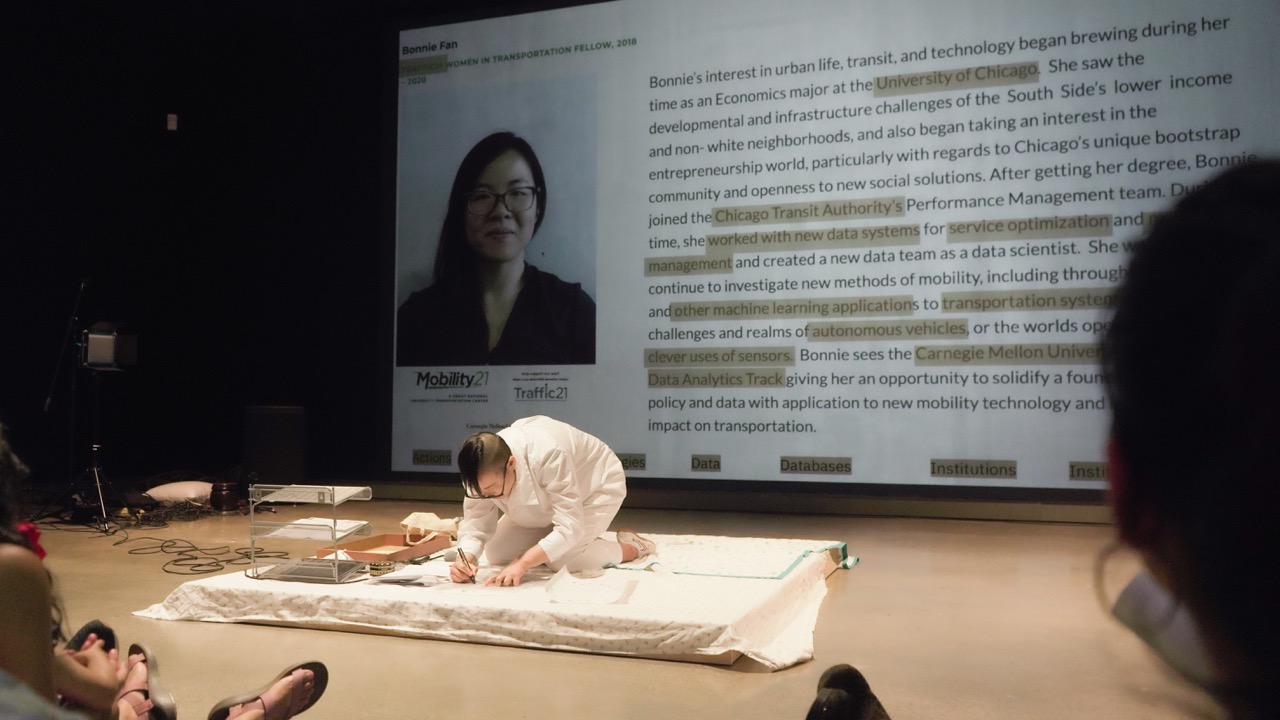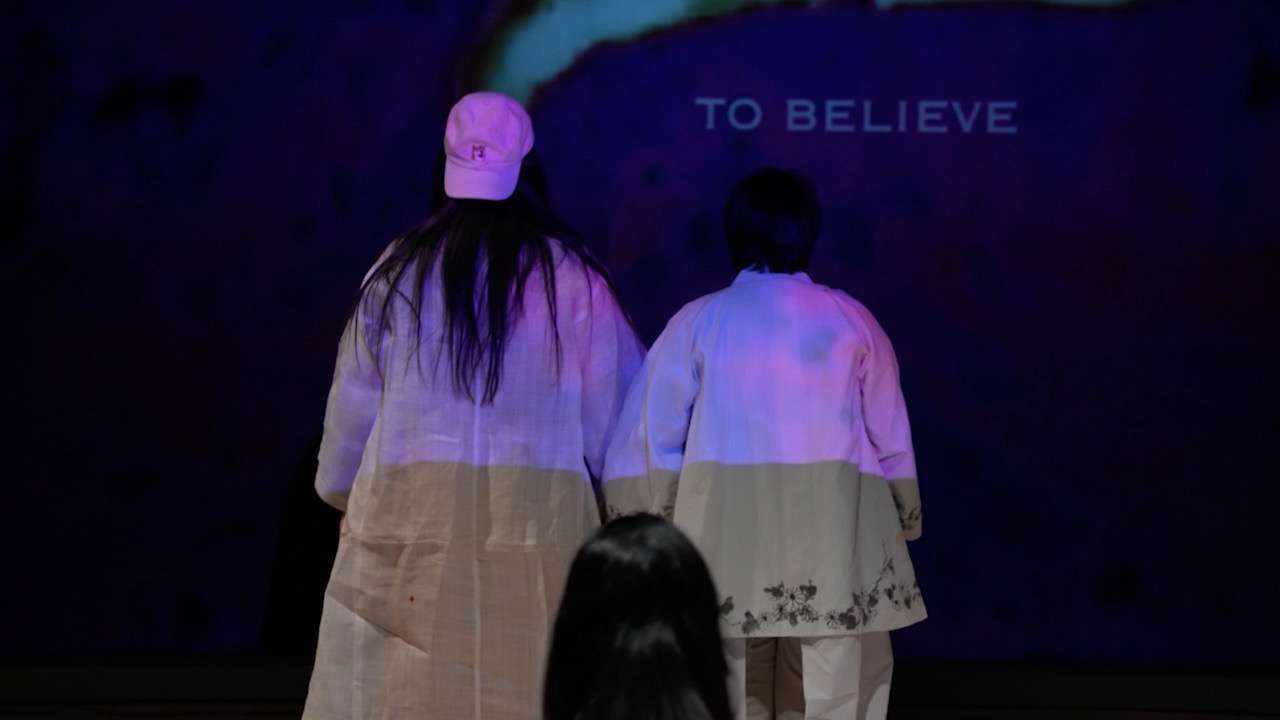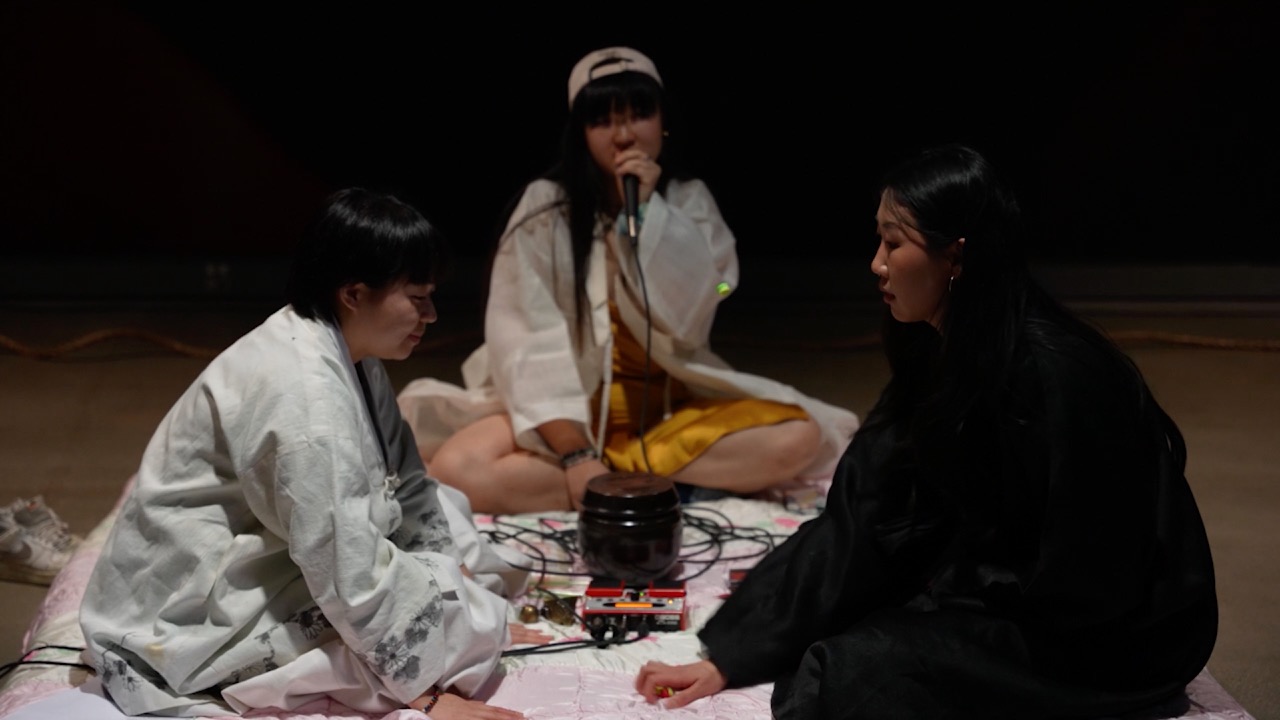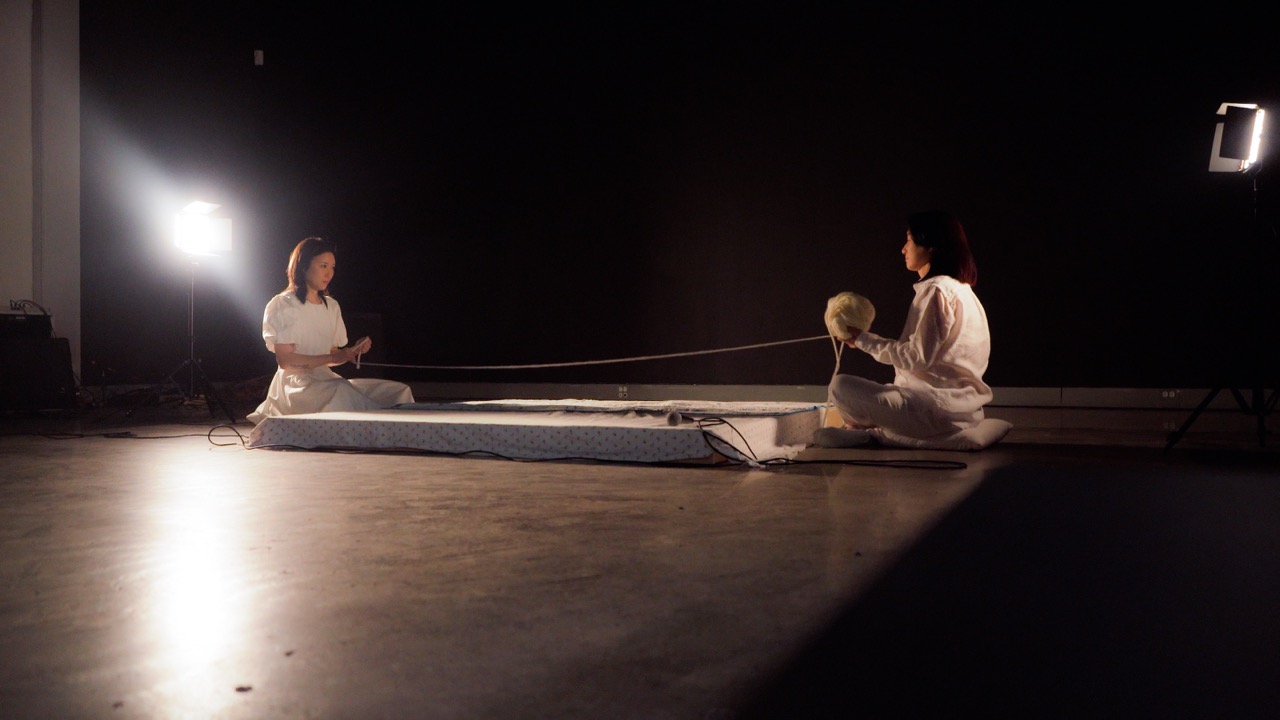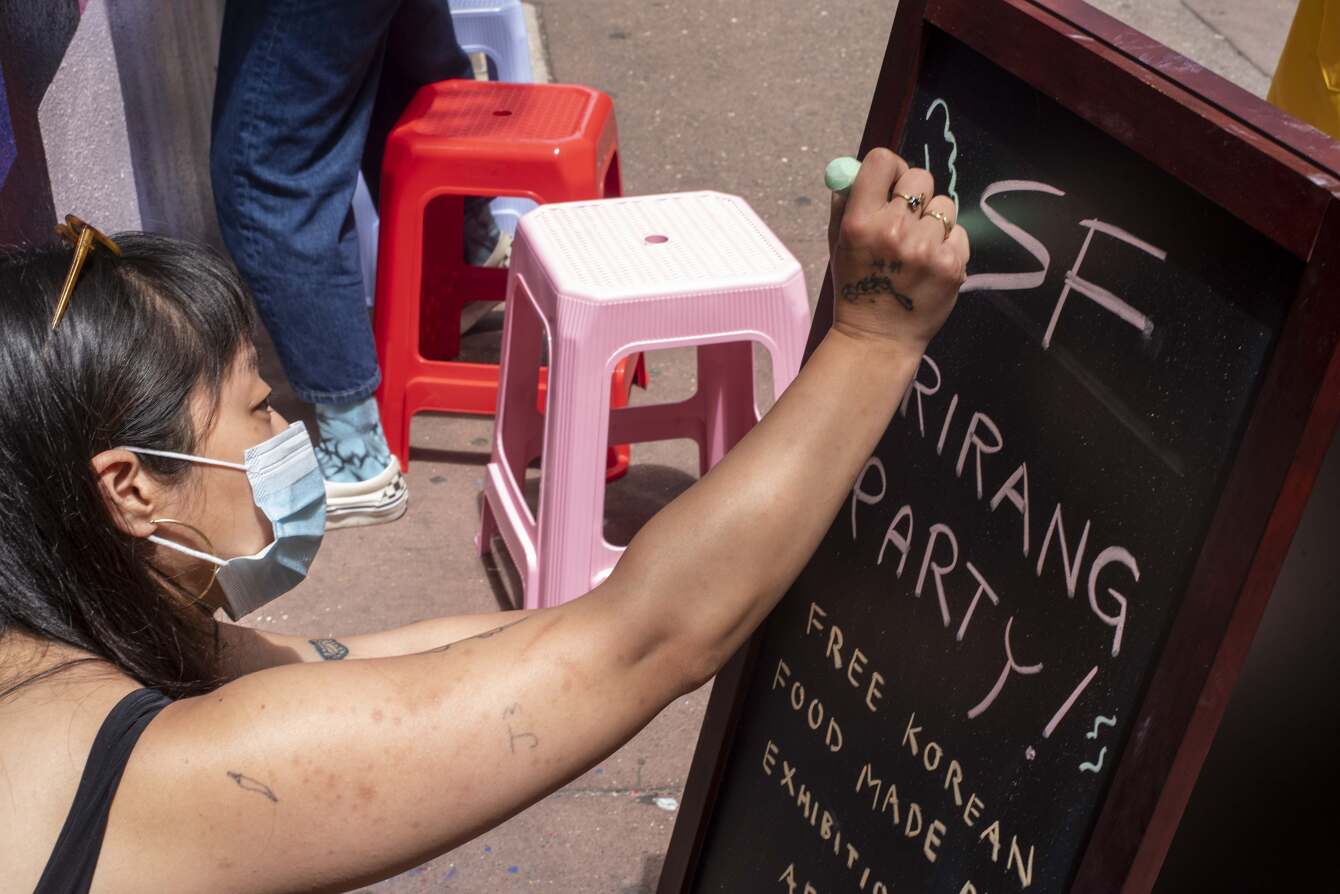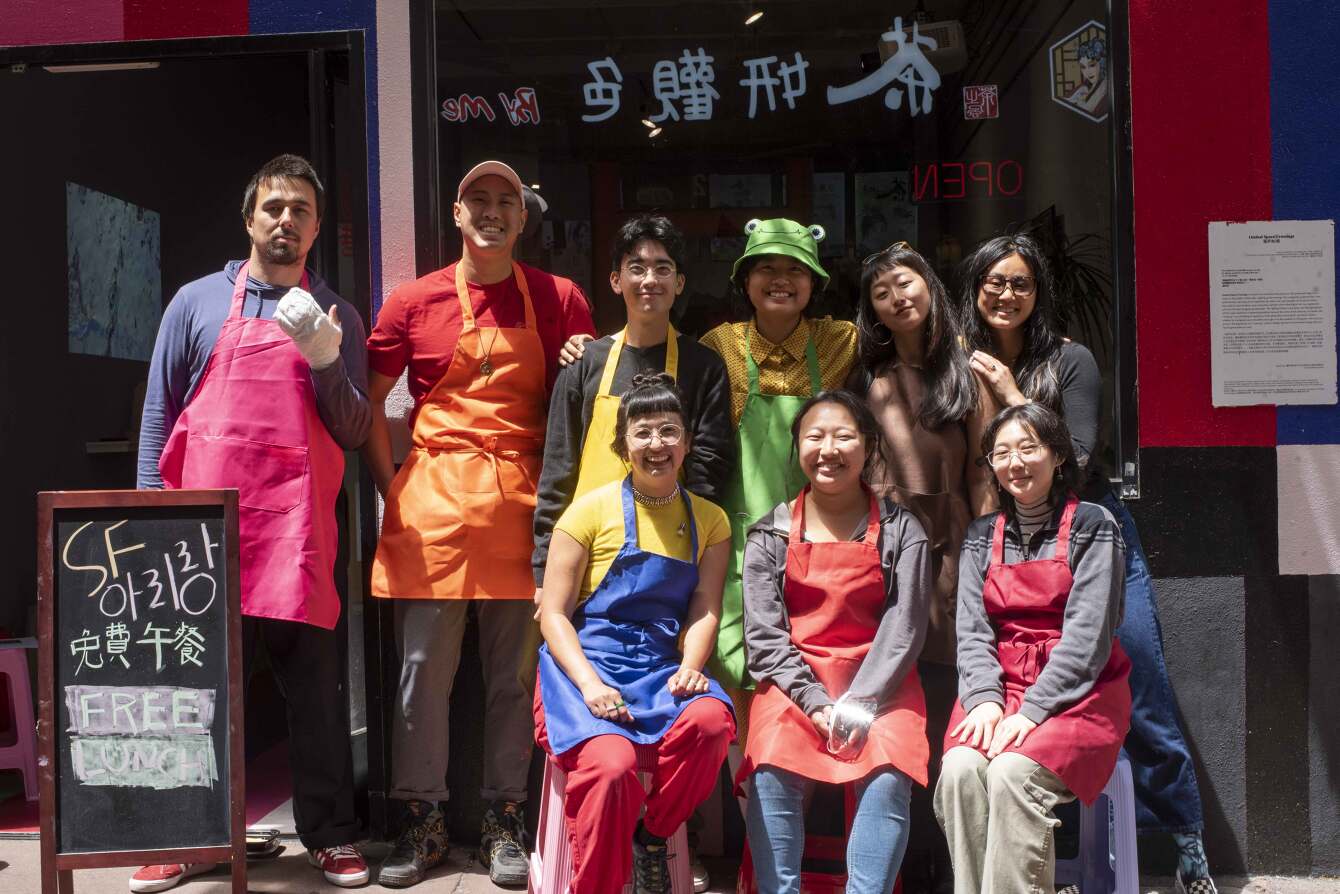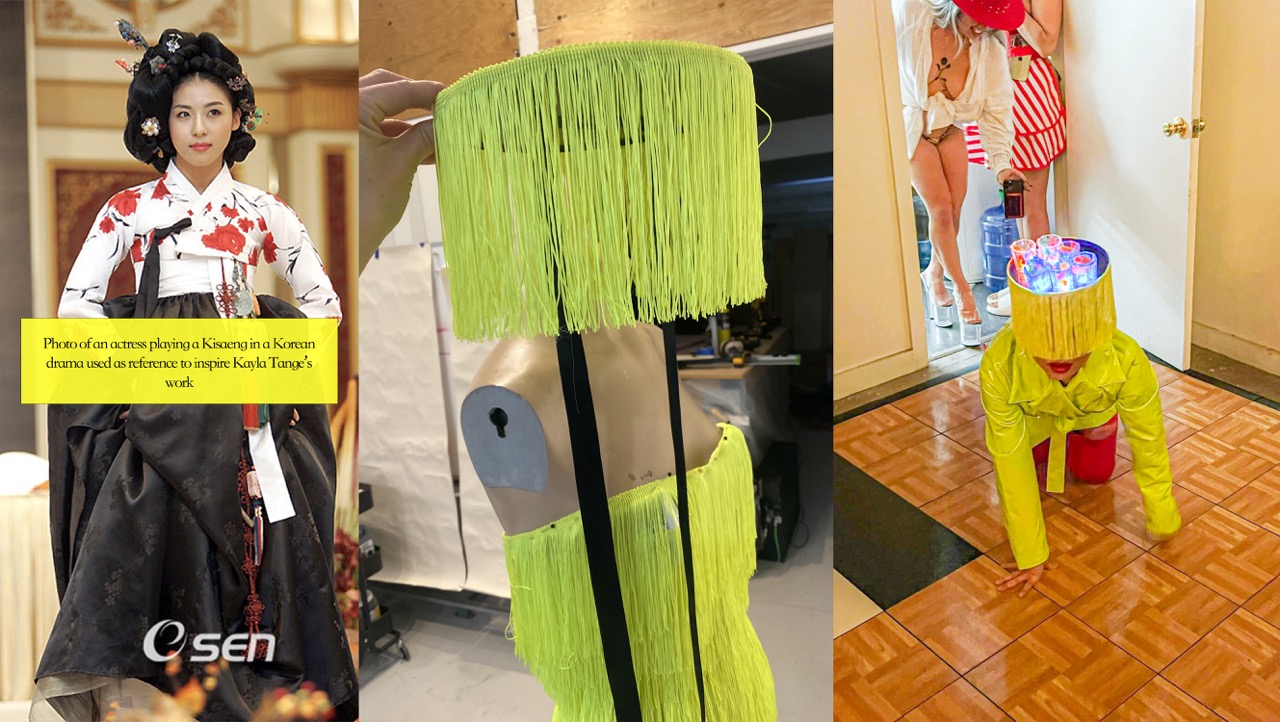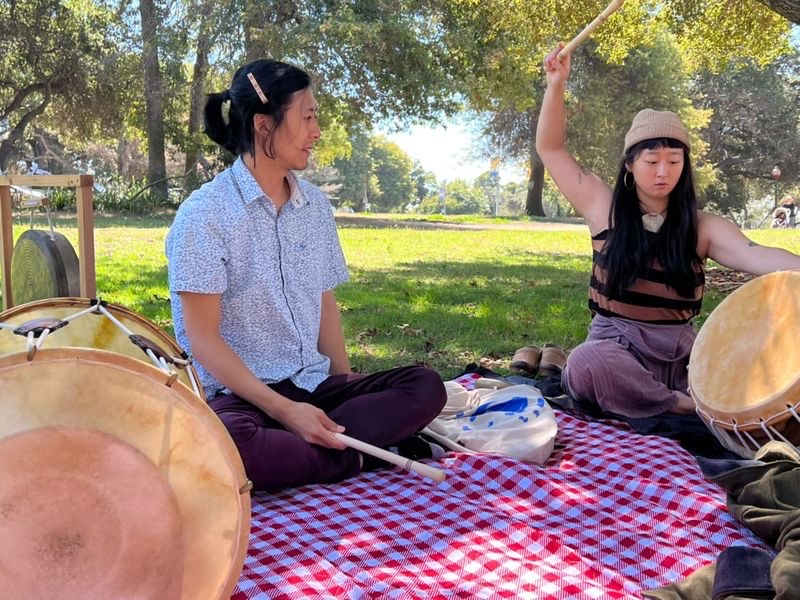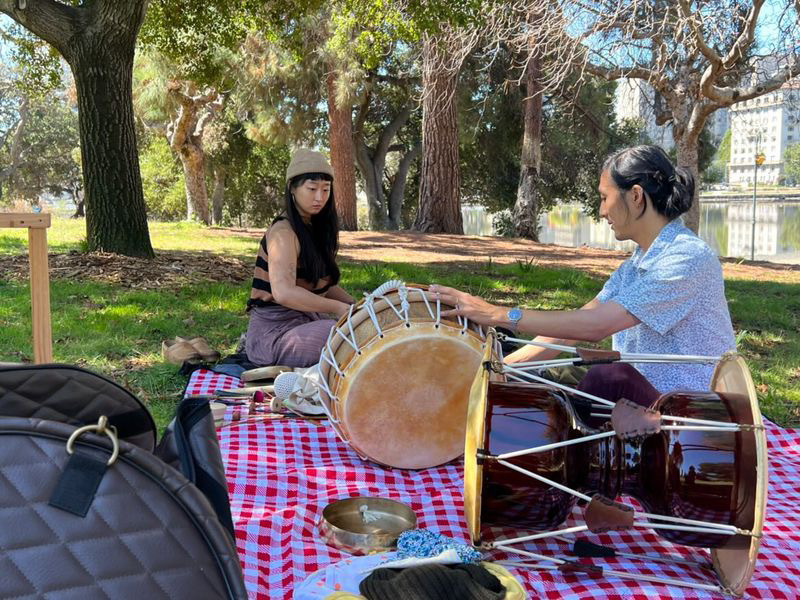Kisaeng House: Fires that Speak Poetry
(2022)Kisaeng House: Fires that Speak Poetry is a safe space for all types of learning and unlearning in the Korean American diaspora. Inspired by the historical Korean 기생 Kiseang, “flowers that speak poetry”, who were Korean women trained to entertain in music, dance, poetry, and sex until 1910. Kisaengs, considered lower class and sexual slaves, were also revolutionary cultural knowledge holders. Kisaengs had social mobility that was rare for females of that era and were secret weapons to mold international politics. Furthermore, the Kisaengs passed traditions of art to younger generations as they were trained in the arts to entertain, the Kisaengs and brothels became the place where the arts were learned and preserved.
Kisaeng House founded by artist Caroline Yoo is an alternative educational school held across the United States in 2022-2023 where five Korean American artists were given funding to produce their own local Kisaeng House in the way they desired. In the United States, we as diaspora artists and community builders often find that our lack of mentorship and access to place is one of the biggest boundaries for our growth. The invited artists are trained performers, artists, and organizers that held workshops in their local communities to share their skillsets, created stages for other artists to perform, taught traditional instruments, and produced new experimental work on how we as Korean diasporic artists are making our own traditions taking cues from our heritage but also includes our Western influences. Our goals were to share, teach, and inspire other fellow Korean Americans to continue to produce their artwork. The following are the projects that took place over the duration of this time.
This project was made possible in part by the Frank-Ratchye Further Fund Grant #2022-037. Additional images can be found here.
Roger Kim – Gesture Controlled Robotic Gayageum & Bay Area Samulnori Group
This new robotic instrument made by Roger Kim is based loosely on the gayageum, a Korean 12 string plucked zither. One string can produce more than one pitch by pushing on the string behind the bridge. In this robotic version, the strings are plucked by servo actuated plectrums and the strings are pushed by servo motors as well.
The robo gayageum can be controlled with a variety of controllers. In this demonstration it is controlled by gestures, using a kinect sensor. Flicking two fingers triggers a servo to pluck the string. Pulling down in the air triggers another servo to push down the string and change the pitch.
This is the third version of robo gayageum, and is an evolution of the first two that I created in collaboration with Andrew Sungtaek Ingersoll. This version is a prototype, envisioned to be a part of a series of modular instruments that can interact with each other, using led lights and light sensitive resistors to detect and react to each other, the environment, and manipulation from visitors.
Roger also had already created his own Korean-American samulnori (Korean traditional percussion) group based in the Bay Area. Roger teaches other Korean-Americans how to play the different instruments in the samulnori group from his own training for no extra cost.
Bio
Roger Kim is a multidisciplinary artist who tells stories with text, music, moving graphics, dance, and interactive electronics. Roger invites audiences to play with tactile controls – buttons and dials – and to sing and gesture in order to control and interact with robotic instruments and computer generated graphics and sound. Roger has performed and exhibited with ICA San Francisco, REDCAT, the YBCA New Frequencies Festival, CultureHub LA, Re-Fest, the San Francisco Contemporary Music Players, Aperture Duo, the Westben Performer/Composer Residency and the California Institute of the Arts. He has received grants and awards from UC Berkeley, CultureHub LA, SFCMP, and the California Institute of the Arts. His most recent work draws heavily from Korean history and traditional Korean musical performance practice, while examining the effect of Korea’s traumatic modern history on both diasporic and native Koreans.
Roger earned a BA in music at UC Berkeley under Myra Melford, and an MFA in music performance and composition from the California Institute of the Arts under Eyvind Kang, Tom Leeser, Nicholas Deyoe, and Francesca Penzani. Roger studied traditional Korean music with a grant from UC Berkeley. His teachers in Korea include Ji Soonja, Scarlett Choi, Kim Dongwon, Moon Soohyeon, and Yeon Jeho.
http://rogerkimmusic.com/ @rodgepodgemusic
Kwonyin – SECRET DOOR IS OPENING
SECRET DOOR IS OPENING is a sound piece for ceremony to conjure ancestral Korean spirits, open hidden spaces of the psyche, and commune with the deeper selves. Vocals and produced by Kwonyin
Bio
Kwonyin is a healing artist, musician, writer, and teacher of yin. She guides the shadow illuminating descent back home to yourself through her signature program CATHARSIS. www.kwonyin.global / ig: @kwonyin
Heesoo Kwon – SF Arirang
𝐒𝐅 아리랑 (𝐒𝐅 𝐀𝐫𝐢𝐫𝐚𝐧𝐠) is a pop-up exhibition at 41.ross in Chinatown San Francisco, California. Reimagining 41 Ross as a temporary Koreatown in SF, we are having 7 artists of Korean diaspora based in the Bay Area whose practice explores their diasporic identities through various mediums and approaches to Korean culture and histories. This included a Korean Food Party where favorite recipes were shared and there was a Kimchi making demo.
The artists featured in 𝐒𝐅 아리랑 (𝐒𝐅 𝐀𝐫𝐢𝐫𝐚𝐧𝐠) are:
Andrew Sungtaek Ingersoll, Michael Hyun Gu Kang, Jane Kang, Danna Kim, Sun park, Sunyoung Park, Heesoo Kwon
https://heesookwon.com/SF-SF-Arirang
Bio
Heesoo Kwon (b. 1990, Seoul, South Korea) is a multidisciplinary artist based in San Francisco. Positioning herself as an artist, activist, archivist, anthropologist, and religious figure, Kwon builds feminist utopias in the digital realm that liberate one from personal, familial, and historical trauma rooted in patriarchy. Central to her practice and substantial bodies of work is Leymusoom, an autobiographical feminist religion she initiated in 2017 as a form of personal resistance against misogyny and an ever-evolving framework for investigating her family histories. Kwon utilizes technologies such as digital archiving, 3D scanning, and animation as her ritualistic and shamanistic tools to regenerate her woman ancestors’ lives without constraints of time and space, and to queer her past, present, and utopian dreams.
Kwon earned a Master of Fine Arts at the University of California, Berkeley and a BA in Business Administration from Ewha Womans University. She is an Assistant Professor in the Animation department at California College of the Arts. She has had solo and group exhibitions at Berkeley Art Museum Pacific Film Archive, Berkeley, CA; Artists’ Television Access, San Francisco, CA; San Francisco Arts Commission Gallery, San Francisco, CA; Gray Area, San Francisco, CA; A.I.R. Gallery, New York, NY; 47 Canal, New York, NY and more.
Kayla Tange – New Kisaeng
Kayla Tange, artist, performer, and organizer, also performs as her alter ego Coco Ono. For this new piece, Coco Ono used inspiration from Kisaeng fashion to re-envision what a modern day Kisaeng outfit would be like for the Korean-American diaspora. Exploring themes of consumption (of the body, of food, of sexuality) and the ideas of service, this performance draws connections from Kisaengs to how Asian-Americans in the United States are highly fetishized and consumed for the white gaze.
Known as the “Erotic Conceptualist” or “Sexistential Crisis,” Coco Ono is a performance, burlesque, and installation artist whose name is derived from Yoko Ono and the chic, liberating attitude of Coco Chanel, a woman who disrupted the standards of their time. Her performances are often inspired by conceptual art, ritual, and catharsis, expressing racial stereotyping and emotional, physical, and cultural confines – often in dark humor, including homages to Andy Warhol, Hunter S. Thompson, and pop culture.
Coco Ono was born in South Korea and adopted by a Japanese American family whose family was put into internment camps during WWII. As a result, she experienced confusion in identity, boundaries, and cultural background. After high school, she moved to Los Angeles and, among other endeavors at the intersection of art-making, self-discovery, and survival, began performing as an exotic and burlesque dancer, serving not only as a sexual projection but as a private confessor. This form of expression is where she felt at home, and healing was found in this exchange of vulnerability.
Bio:
Kayla Tange is a Los Angeles-based artist born in South Korea. She was adopted by a Japanese American couple whose family were interned during WWII. Informed by lived experiences and desire to both subvert cultural stereotypes and heal ancestral trauma, she explores psychic boundaries, emotional labor, and permanence as recurring themes in her work. Pendulating between literal and satirical, her practice utilizes performance and installation to navigate uncertainty and reclaim the body using cultural references and stories of shame as symbolic vehicles. She is the co-producer of Sacred Wounds, a show focused on ritual and community for Asian performers, as well as a co-organizer for Stripper Co-op, a series of erotic artist-run pop-up events. She has performed or exhibited at Human Resources, Highways Performance Space, REDCAT, Torrance Art Museum, Performance Studies International, Melbourne, OUTFEST, Asian Pacific Film Festival, Wexner Center for the Arts, and Institute of Contemporary Art San Francisco.
https://www.kaylatange.com/being-coco-ono / @kayla.tange
Caroline Yoo
Caroline Yoo during her MFA thesis exhibition lost | born in translation at the Miller Institute of Contemporary Art, fabricated a 6 feet by 6 feet wooden stage where Yoo invited 5 different Asian diaspora artists living in Pittsburgh who have never performed before but were interested in performance, to create a new work with space to try methodologies they had never used before. Three out of the five artists were Korean diaspora. In Pittsburgh there is a lack of performance art spaces and even less spaces for Asian diaspora performers to tell their own stories. This was my way of creating a little stage and little space for my friends and collaborators to feel comfortable taking something new on.
Performers: Iris Kang & Sarah Kim, Davine Byon & Jeemin Kim, Tingting Chen, Bonnie Fan
Bio:
Caroline Yoo is an interdisciplinary artist who was born and raised in the United States to Korean immigrants. Her art practice of performance, social practice, intimate gatherings, and video installations uses translation as a tool to map forgotten histories – to reveal psychological shadows haunting the diaspora – and performs contemporary translations of rituals for the living. Tracing the edges of the hidden and silenced perspectives of the past to inform the personal and political of the present, Yoo visualizes narratives utilizing multiple voices in tension with each other to highlight the complicated structures of empire and power while unraveling imperial illusions through geopolitical poetry.
She is a co-founder and co-leader of Hwa Records, JADED (named 2022 People of the Year by the Pittsburgh City Paper), and Han Diaspora Group. Yoo has performed, exhibited, and culturally produced at Carnegie Museum of Art; Institute of Contemporary Art, San Francisco; McDonough Museum of Art; University of Southern California; LA Art Show; Kelly Strayhorn Theater; and more.
